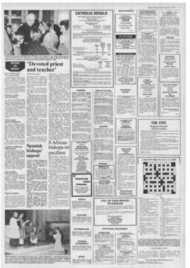Page 1, 11th February 1977
Page 1

Page 6

Report an error
Noticed an error on this page?If you've noticed an error in this article please click here to report it.
Tags
Share
Related articles
Jesuit Memorial
Rhodesia Missions Still Unarmed
Rhodesia Murders Blamed On Government
Priests Forced From Rhodesia
Missionaries' Deaths Blamed On Smith Regime
Seven missionaries killed in Rhodesia
1-By Frances Gumley SEVEN Catholic missionaries — three Jesuits and four Dominican nuns — were gunned down on Sunday by a terrorist gang at St Paul's Mission at Musami, Rhodesia.
They were Fr Martin Thomas, Fr Christopher Shepherd-Smith, Brother John Conway, Sister Joseph Wilkinson, Sister Epiphany Schneider, Sister Magdala Lewandowski and Sister Ceslau Stiegler.
The district where the seven worked, 57 miles east of Salisbury, has been much troubled recently by guerrilla activity. Fr Dunstan Myerscough survived the attack and was able to give a first-hand account of the massacre to Fr Patrick McNamara, the superior of the Jesuit mission in Salisbury.
Fr Myerscroft, 65, from Bolton, Lancashire, said the young black attackers wore "some kind of uniform" but did not identify themselves as belonging to any particular organisation. He said he was convinced they were guerrillas.
"They just seemed to be rounding up Europeans. The African staff and nuns were ignored. When one of the nuns asked them what they wanted, one of them replied: `We want our country.'"
Fr Myerscough was ordered from his room and taken to a waterlogged sand track which runs through the mission cornpound. There he was joined by the seven who were murdered.
There was disagreement among the terrorists about who should commit the murders. One stepped forward and then withdrew, then another, and finally all but three ran off. "They raised their guns and opened fire. As soon as it started I threw myself to the ground. I don't know how long the burst lasted. I heard the terrorists running away and when I looked at the others I knew there was nothing 1 could do for them."
More than 100 rounds from Russian automatic rifles and guns had been fired into the group. Fr Myerscough was not hit at all.
Fr Martin Thomas, 45, was the son of the late Sir Reginald Thomas, a ballistics expert at the Home Office. Fr Thomas was brought up in Wimbledon and attended Wimbledon College. His brother, Fr Hilary Thomas, is at Stonyhurst College.
Mr Hugh Kay, the Jesuit Information Officer in London, said "Fr Thomas was one of the unsung heroes who worked extremely hard in routine jobs. He was a very devoted priest and teacher."
Fr Christopher ShepherdSmith, 33, was on his 'first assignment after ordination. He was born in Tanzania and educated in Nairobi. His qualifications in African languages and social studies had enabled him to do valuable work in the field of African adult education.
Brother John Conway, 57, was born in Tralee, Co Kerry. He had been in Rhodesia for 23 years and had built much of the Musami mission with his bare hands.
When he first went to Musami he started from scratch. Now the 2,000-strong mission includes a primary school, a secondary school, a social centre, a hospital and a farm.
Sister Joseph Wilkinson, 50, came from Leigh, near Manchester. Sister Amanda, of the Dominican convent in Greenwich, who worked with Sister Joseph in Africa, said: "This is a terrible tragedy, made worse by the fact that Sister Joseph loved the African people so well."
The three other Dominican nuns all came from Germany and taught in the teacher training college and the secondary school.
Archbishop Patrick Chakaipa of Salisbury said: "At Musami, a blow has. been struck not only against the missionaries but also against the suffering and needy African people. I condemn this evil act."
Archbishop Dwyer of Birmingham, President of the Bishops' Conference of England and Wales, has sent a telegram of condolence to Archbishop Chakaipa. In it he said: "May their sacrifice plead before God to move all the people of Rhodesia to achieve peace and justice."
Bishop Mahon, Bishop in West London and President of the Commission for Justice and Peace, Said: "People of goodwill everywhere will be deeply shocked by this killing and will condemn the senseless outrage . . . These killings will not affect the Church's commitment to work for the good of all citizens which is based on the Gospel."
A Requiem Mass for the seven killed will be held at 11 am on February 16 at Farm Street, the London Jesuit Church. Meanwhile at Musami there will be no drastic reaction. No defences will be put up, no personnel withdrawn. In time, replacements will be made.
Mr Robert Mugabe, who is generally regarded as the political voice of the Zimbabwe African National Union, ZANU, has firmly denied allegations that ZANU was responsible for the massacre.
Mr Mugabe, described by a Jesuit spokesman as "a great friend of the Church" said that ZANU had good relations with church organisations. He added: "The church group is one of the democratic forces we are relying on . . . "Definite instructions are given and our targets are quite clear. Our guerrillas know who are our enemies and who are our friends, and the missionaries have always been sympathetic to our objectives."
• Allegations of brainwashing and intimidation have been levelled against the Botswana police by Fr Edgar Sommerreisser, who accompanied the parents of the children kidnapped from the Manama Sunday School in an attempt to bring the children back from Botswana.
He said parents and children did not have a chance to talk together freely. "Each child was brought into the room by a policeman . . They were asked by their parents if they wanted to go home with them, and if the answer was no' they were rushed straight away."
blog comments powered by Disqus









